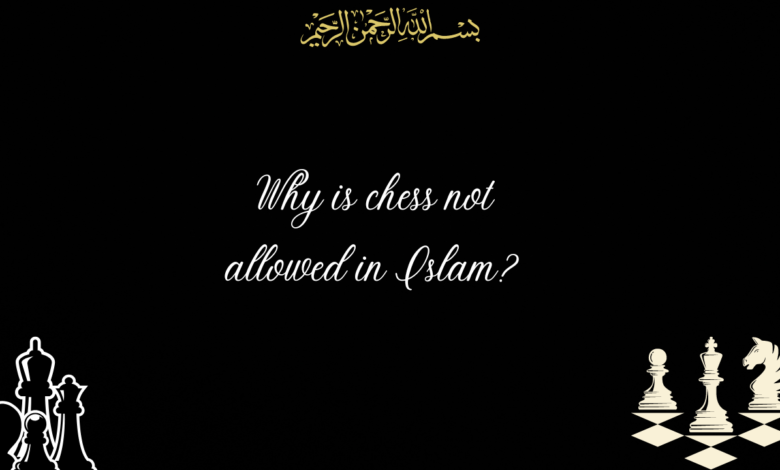Why is chess not allowed in Islam?

Introduction
Chess, a game of strategy and intellect, has fascinated people across the globe for centuries. However, its history in the Islamic world has been marked by controversy and debate. The question of whether chess is allowed in Islam has generated extensive discussions among scholars and religious authorities. This article delves into the reasons behind the prohibition of chess in Islam, exploring the historical context, theological arguments, and varying perspectives on this contentious issue.
Historical Context
The origins of chess can be traced back to ancient India, and it gradually spread to other parts of the world, including the Islamic world. Chess arrived in the Islamic empire during the early Islamic period, and it was initially embraced by scholars, nobility, and rulers as a means of enhancing strategic thinking and mental acuity. However, as time passed, concerns began to emerge about the potential negative consequences of the game.
Theological Arguments
The prohibition of chess in Islam stems from several theological arguments that have evolved over centuries. While there is no explicit mention of chess in the Quran or Hadith (sayings and actions of the Prophet Muhammad), scholars have drawn conclusions based on broader Islamic principles:
Gambling and Time-Wasting: One of the primary concerns raised by opponents of chess is its potential to lead to gambling and excessive time-wasting. Islam strongly discourages engaging in activities that distract believers from their religious duties or lead to unproductive behaviors.
Imitating Non-Muslim Practices: Some scholars have argued that chess was associated with non-Muslim cultures, and its adoption could be seen as imitating practices of non-believers. Islam places a strong emphasis on distinctiveness and adherence to Islamic values.
Negative Influence on Character: Concerns have been raised about the effect of intense competition and the emotions associated with winning and losing in chess. Scholars argue that these emotions could negatively impact a believer’s character and behavior.
Varying Perspectives
While many Islamic scholars have historically held the view that chess is impermissible, there has also been a diversity of opinions within the Islamic legal tradition. Some scholars argue that chess can be permitted as long as it does not lead to gambling or excessive preoccupation, and as long as it doesn’t divert believers from their religious obligations.
Modern Interpretations
In contemporary times, the view on chess within the Islamic world has evolved. Some scholars and religious authorities consider the concerns that led to the prohibition of chess to be less relevant today. They argue that as long as the game is played responsibly and in moderation, it does not inherently contradict Islamic principles.
Conclusion
The controversy surrounding the permissibility of chess in Islam highlights the dynamic nature of religious interpretation and the evolution of cultural norms. While historical concerns about gambling, time-wasting, and imitation of non-Muslim practices have led to the prohibition of chess by some Islamic scholars, modern perspectives tend to focus on responsible and moderate engagement. As with many issues in religion, the question of whether chess is allowed in Islam is subject to diverse opinions, reflecting the complexity of balancing tradition with changing times.
FAQs about Why Chess Might Be Discouraged in Islam
Why is chess considered controversial in Islam?
Chess is not universally prohibited in Islam, but its permissibility has been debated among Islamic scholars. Some scholars argue that certain aspects of chess conflict with Islamic teachings, leading to differing opinions within the Islamic community.
What are the main concerns raised by scholars regarding chess?
One concern is that chess can lead to wastefulness of time and distract individuals from fulfilling their religious duties. Additionally, there are opinions that chess involves gambling, which is prohibited in Islam. Some scholars also argue that the imagery of certain pieces, such as the king and queen, can be reminiscent of royalty or idolatry.
Is there a consensus among scholars about the prohibition of chess?
No, there isn’t a unanimous consensus. Different Islamic scholars and schools of thought hold varying opinions on the permissibility of chess. Some consider it acceptable as long as it doesn’t lead to negligence of religious obligations, while others view it as entirely impermissible.
Are there historical reasons for the skepticism towards chess in Islam?
Yes, historically, chess was associated with gambling, excessive time-wasting, and preoccupation with worldly matters. Some early Islamic scholars might have discouraged it due to these reasons, although opinions have evolved over time.
Can chess be played for educational or recreational purposes in Islam?
Many contemporary scholars allow chess for educational or recreational purposes as long as it doesn’t interfere with religious duties or promote gambling. If played in moderation and with the right intention, it may not be considered problematic.
How does cultural context influence the perception of chess in Islam?
Cultural norms and attitudes towards games like chess can vary among different Muslim communities. In some cultures, chess is accepted and played widely, while in others, its permissibility might be more disputed due to historical perspectives or conservative interpretations.






